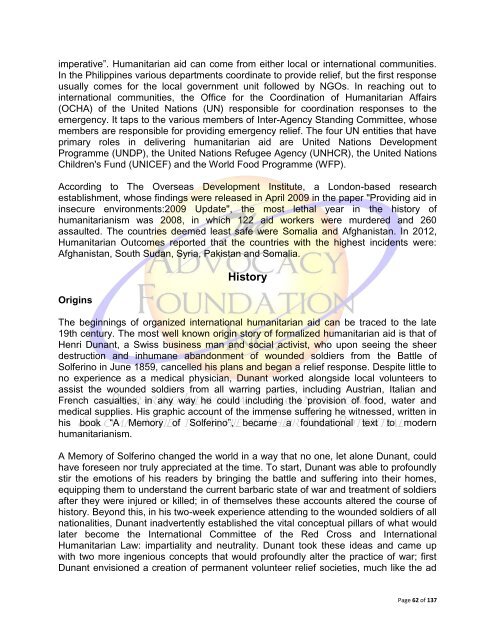The Theology of Missions
The Theology of Missions
The Theology of Missions
You also want an ePaper? Increase the reach of your titles
YUMPU automatically turns print PDFs into web optimized ePapers that Google loves.
imperative”. Humanitarian aid can come from either local or international communities.<br />
In the Philippines various departments coordinate to provide relief, but the first response<br />
usually comes for the local government unit followed by NGOs. In reaching out to<br />
international communities, the Office for the Coordination <strong>of</strong> Humanitarian Affairs<br />
(OCHA) <strong>of</strong> the United Nations (UN) responsible for coordination responses to the<br />
emergency. It taps to the various members <strong>of</strong> Inter-Agency Standing Committee, whose<br />
members are responsible for providing emergency relief. <strong>The</strong> four UN entities that have<br />
primary roles in delivering humanitarian aid are United Nations Development<br />
Programme (UNDP), the United Nations Refugee Agency (UNHCR), the United Nations<br />
Children's Fund (UNICEF) and the World Food Programme (WFP).<br />
According to <strong>The</strong> Overseas Development Institute, a London-based research<br />
establishment, whose findings were released in April 2009 in the paper "Providing aid in<br />
insecure environments:2009 Update", the most lethal year in the history <strong>of</strong><br />
humanitarianism was 2008, in which 122 aid workers were murdered and 260<br />
assaulted. <strong>The</strong> countries deemed least safe were Somalia and Afghanistan. In 2012,<br />
Humanitarian Outcomes reported that the countries with the highest incidents were:<br />
Afghanistan, South Sudan, Syria, Pakistan and Somalia.<br />
Origins<br />
History<br />
<strong>The</strong> beginnings <strong>of</strong> organized international humanitarian aid can be traced to the late<br />
19th century. <strong>The</strong> most well known origin story <strong>of</strong> formalized humanitarian aid is that <strong>of</strong><br />
Henri Dunant, a Swiss business man and social activist, who upon seeing the sheer<br />
destruction and inhumane abandonment <strong>of</strong> wounded soldiers from the Battle <strong>of</strong><br />
Solferino in June 1859, cancelled his plans and began a relief response. Despite little to<br />
no experience as a medical physician, Dunant worked alongside local volunteers to<br />
assist the wounded soldiers from all warring parties, including Austrian, Italian and<br />
French casualties, in any way he could including the provision <strong>of</strong> food, water and<br />
medical supplies. His graphic account <strong>of</strong> the immense suffering he witnessed, written in<br />
his book “A Memory <strong>of</strong> Solferino”, became a foundational text to modern<br />
humanitarianism.<br />
A Memory <strong>of</strong> Solferino changed the world in a way that no one, let alone Dunant, could<br />
have foreseen nor truly appreciated at the time. To start, Dunant was able to pr<strong>of</strong>oundly<br />
stir the emotions <strong>of</strong> his readers by bringing the battle and suffering into their homes,<br />
equipping them to understand the current barbaric state <strong>of</strong> war and treatment <strong>of</strong> soldiers<br />
after they were injured or killed; in <strong>of</strong> themselves these accounts altered the course <strong>of</strong><br />
history. Beyond this, in his two-week experience attending to the wounded soldiers <strong>of</strong> all<br />
nationalities, Dunant inadvertently established the vital conceptual pillars <strong>of</strong> what would<br />
later become the International Committee <strong>of</strong> the Red Cross and International<br />
Humanitarian Law: impartiality and neutrality. Dunant took these ideas and came up<br />
with two more ingenious concepts that would pr<strong>of</strong>oundly alter the practice <strong>of</strong> war; first<br />
Dunant envisioned a creation <strong>of</strong> permanent volunteer relief societies, much like the ad<br />
Page 62 <strong>of</strong> 137

















